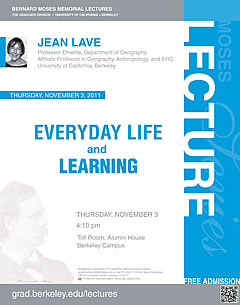
Jean Lave
Professor Emerita, Department of Geography, and Affiliate Professor, Departments of Geography, Anthropology, and the Energy Resources Group, University of California, Berkeley
Bernard Moses Memorial Lecture
November 3, 2011 — 4:10 PMToll Room, Alumni House — UC Berkeley Campus
About The Lecture In her lecture, Jean Lave will argue that all theoretical problematics across the social sciences include assumptions about learning, whether explicitly or not. Learning is integral to conceptions of knowledge, inquiry, revolution, and changing practice. Accordingly, social … Continued
Toll Room, Alumni House - UC Berkeley Campus Berkeley Graduate Lectures [email protected] false MM/DD/YYYYAbout The Lecture
In her lecture, Jean Lave will argue that all theoretical problematics across the social sciences include assumptions about learning, whether explicitly or not. Learning is integral to conceptions of knowledge, inquiry, revolution, and changing practice. Accordingly, social scientists have substantive stakes in the issue – historical, cultural, spatial, political, and social. In engaging questions of learning, Lave finds it useful and interesting to start from that multiply excluded but always central foil, “everyday life.”
About Jean Lave
Jean Lave is renowned for her social, historical and relational anthropology of learning, in critical counterpoint to conventional psychological views. Lave’s ethnographic studies — of apprenticeship among Vai and Gola tailors in Liberia in the 1970s, of everyday math practices in Orange County, California in the 1980s, and of processes of ‘becoming British in Portugal” in the 1990s – have led her to inquire also into the complex theoretical implications that follow from claims for the socially, historically situated character of all learning. Why diverge from traditional psychological frameworks? In her view these are problematic because they are institutionally grounded in schooling while at the same time claiming to be universally relevant to theorizing learning. Lave argues that a critical stance is essential, for such common assumptions are ubiquitous. This matters, she suggests, partly because all theoretical problematics across the social sciences include assumptions about learning, whether explicitly or not. Assumptions about learning are integral to many different conceptions of knowledge, inquiry, revolution, and changing practice. Accordingly, social scientists have substantive stakes in the issue – historical, cultural, spatial, political, and social. In engaging questions of learning Lave finds it useful and interesting to start from that multiply excluded but always-central foil, “everyday life.”
Lave has published numerous articles and several books: Cognition in Practice(1988); Situated Learning: Legitimate Peripheral Participation (with E. Wenger, 1991; Understanding Practice (co-edited with S. Chaiklin, 1993). More recently her work has taken a historical turn with a collaborative ethnohistorical research project, Producing Families, Trading in History on British merchant families engaged in the port wine trade in Portugal — (History in Person: Enduring Struggles, Contentious Practice, Intimate Identities (2000), edited with Dorothy Holland). She has just published Apprenticeship in Critical Ethnographic Practice(2011), a relational account of tailors’ apprenticeship in Liberia interwoven with an account of ethnographic research as apprenticeship to one’s own changing practice. She is currently working on a book on social practice theory.